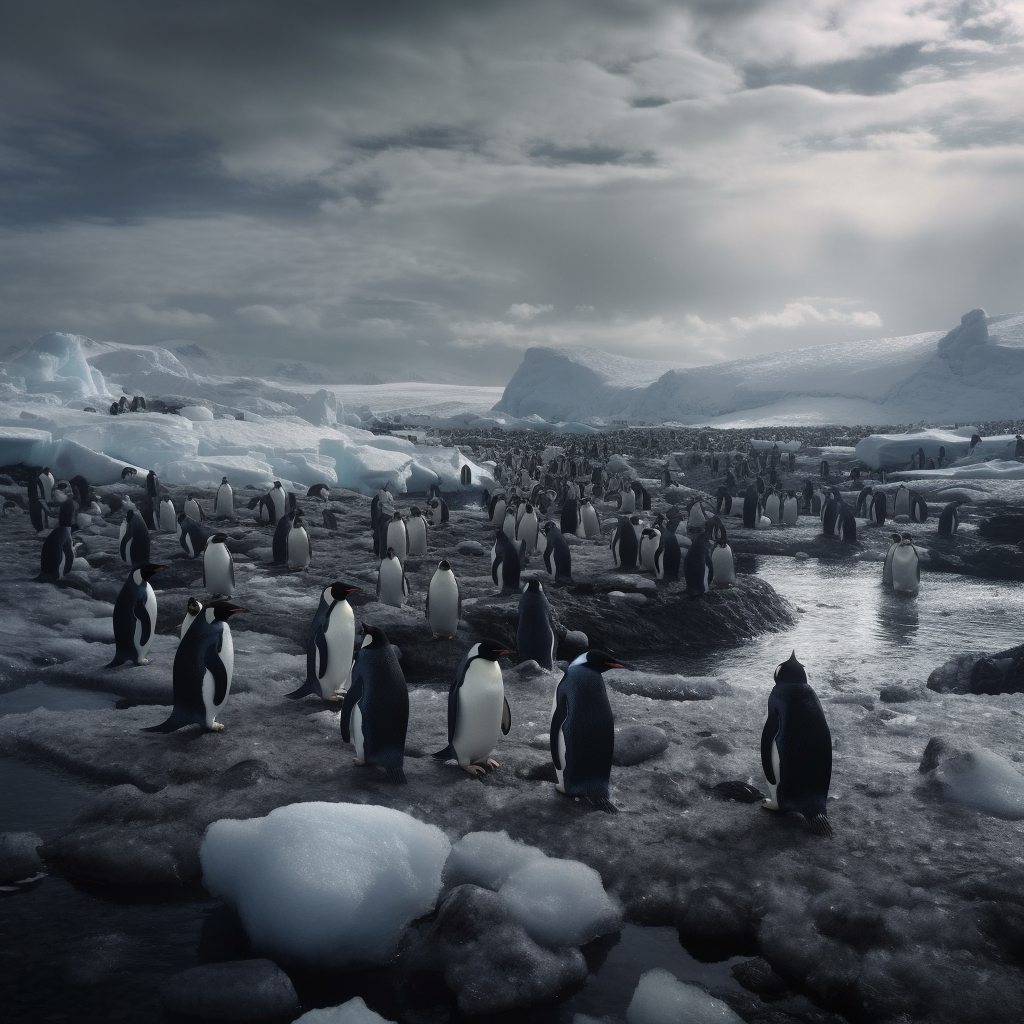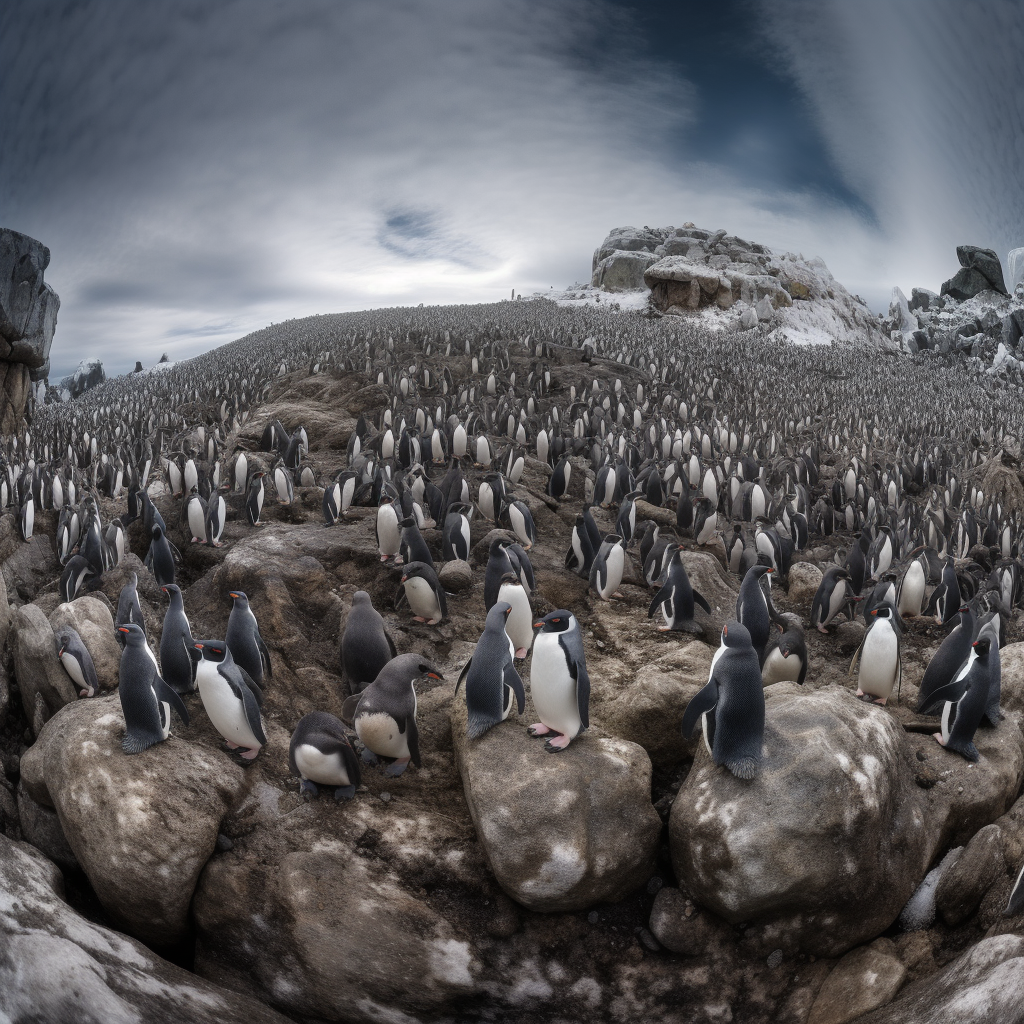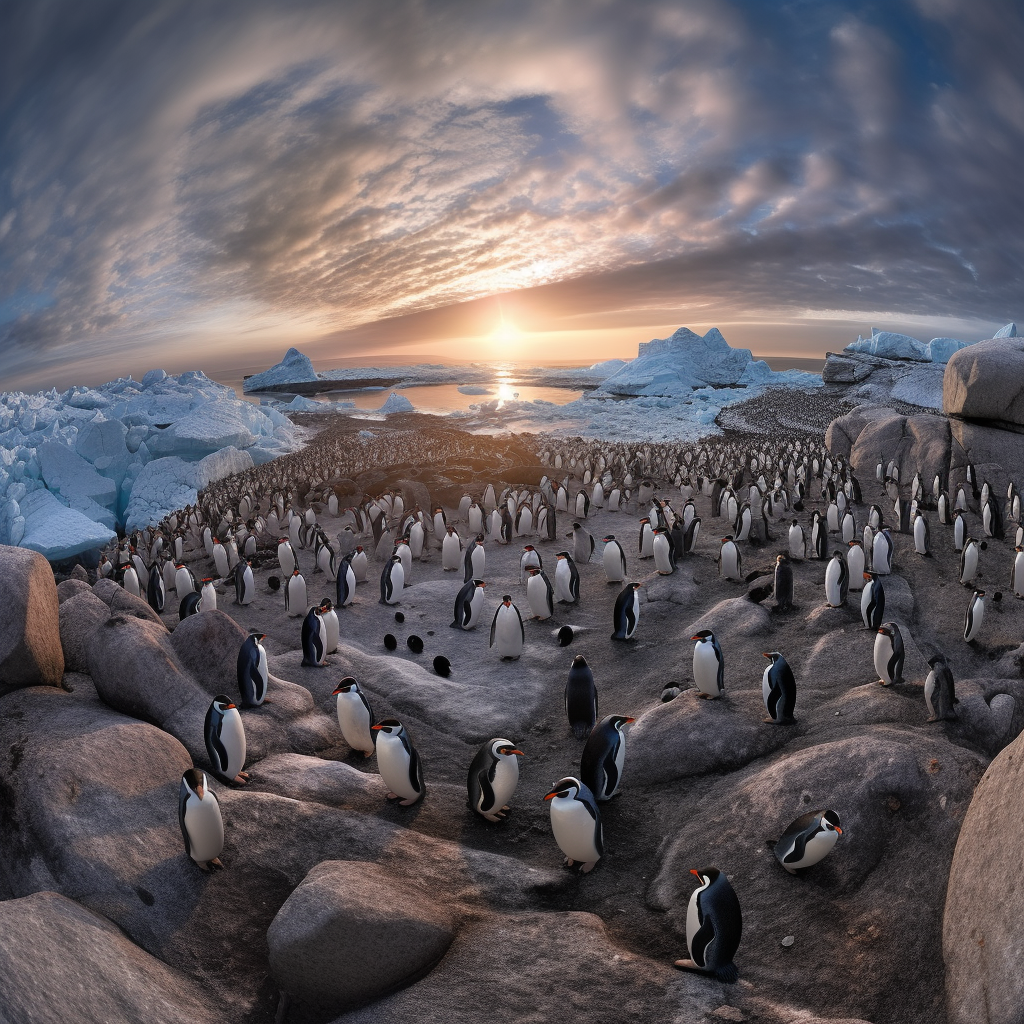Penguins are fascinating creatures that have adapted to survive in some of the harshest environments on Earth. These flightless birds are known for their unique appearance and their ability to swim gracefully through icy waters. However, one of the most remarkable aspects of penguins is their ability to endure long periods without food. In this article, we will explore just how long penguins can go without eating and the incredible strategies they employ to survive in their challenging habitats. So, let’s dive in and discover the remarkable world of penguins and their extraordinary ability to withstand hunger.
Key Takeaways
- Penguins can go without food for several weeks, depending on the species and their energy reserves.
- During fasting periods, penguins rely on their fat stores to survive.
- Emperor penguins are known to endure the longest fasting periods, sometimes going without food for up to 4 months.
- Penguins have evolved unique adaptations to conserve energy and survive extended periods without food.
- Climate change and overfishing can have a significant impact on penguins’ ability to find food, endangering their survival.
Understanding Penguins’ Dietary Habits

Penguins are fascinating creatures that have adapted to survive in some of the harshest environments on Earth. One key aspect of their survival is their dietary habits. By understanding what penguins eat and how they feed, we can gain insight into their remarkable ability to endure periods without food.
A. The Typical Diet of Penguins
Penguins are carnivorous birds, which means their diet primarily consists of fish and other marine creatures. However, the specific types of prey they consume can vary depending on the species and their habitat.
-
Antarctic Krill: Krill is a small, shrimp-like crustacean that forms a significant part of the diet for many penguin species. These tiny creatures are abundant in the Southern Ocean and provide a valuable source of nutrition for penguins.
-
Fish: Penguins are skilled hunters and can catch a variety of fish species. Some common fish found in their diet include anchovies, sardines, and lanternfish. These fish are rich in fats and proteins, providing the penguins with the energy they need to survive.
-
Squid: Squid is another important food source for penguins. These cephalopods are agile swimmers, but penguins have developed techniques to catch them. Squid provide essential nutrients and are often consumed by penguins living in areas where fish populations are scarce.
-
Other Prey: While fish, krill, and squid make up the bulk of a penguin‘s diet, they may also consume other marine creatures such as small crustaceans, octopus, and even small seals or penguins in rare cases.
B. The Feeding Cycle of Penguins
Penguins have evolved to cope with the challenges of finding food in their icy habitats. They exhibit a unique feeding cycle that allows them to maximize their chances of survival.
-
Feeding Intervals: Penguins typically feed at regular intervals, which can vary depending on the species and environmental conditions. Some penguins may feed every day, while others may go several days without food. Emperor penguins, for example, can endure fasting periods of up to 4 months during the breeding season.
-
Energy Reserves: To sustain themselves during periods of food scarcity, penguins rely on their energy reserves. These reserves are built up through periods of abundant food availability, allowing them to survive when food is scarce.
-
Hunting Techniques: Penguins employ various hunting techniques to catch their prey. Some species, like the Gentoo penguin, use a “porpoising” technique, where they leap out of the water to catch fish near the surface. Others, like the Emperor penguin, dive to great depths to catch prey.
-
Survival Skills: Penguins have developed remarkable adaptations to survive in their challenging environments. For example, they have a streamlined body shape that allows them to swim efficiently and catch prey. They also have specialized feathers that provide insulation and reduce drag in the water.
In conclusion, penguins have unique dietary habits that enable them to thrive in their icy habitats. By consuming a diet primarily consisting of fish, krill, and squid, they obtain the necessary nutrients to survive. Their feeding cycle, energy reserves, hunting techniques, and survival skills all contribute to their ability to endure periods without food. Understanding these aspects of penguins’ dietary habits helps us appreciate the remarkable adaptations that allow these birds to thrive in some of the most extreme environments on our planet.
The Survival Mechanism: How Long Can Penguins Go Without Food?
A. Factors Influencing Penguins’ Fasting Duration
When it comes to surviving in the harsh Antarctic environment, penguins have developed remarkable adaptations. One of these adaptations is their ability to endure extended periods without food. However, the duration of penguins’ fasting periods can vary depending on several factors.
-
Species: Different penguin species have varying abilities to withstand food scarcity. For example, Emperor penguins are known to endure the longest fasting periods, sometimes going without food for up to four months during the breeding season. Other species, such as Adélie and Chinstrap penguins, may fast for shorter durations.
-
Energy Reserves: Before entering a fasting period, penguins build up their energy reserves by consuming large amounts of food. These reserves play a crucial role in sustaining them during times of scarcity. Penguins with higher energy reserves can endure longer fasting periods compared to those with lower reserves.
-
Feeding Habits: Penguins that rely on food sources that are more abundant and accessible tend to have shorter fasting durations. For example, penguins that feed on fish or krill, which are relatively more abundant in the Antarctic waters, may have shorter fasting periods compared to those that rely on less abundant prey.
-
Environmental Conditions: The availability of food in the penguins‘ habitat greatly influences their fasting duration. Factors such as sea ice coverage, ocean currents, and weather patterns can impact the distribution and accessibility of prey. During periods of food scarcity, penguins may be forced to fast for longer durations.
B. The Science Behind Penguins’ Fasting Ability
Penguins have evolved physiological and behavioral adaptations that enable them to survive extended periods without food. These adaptations allow them to conserve energy and maintain their bodily functions during fasting periods.
-
Metabolic Rate: Penguins have a unique ability to lower their metabolic rate, which helps them conserve energy during fasting. By reducing their metabolic rate, penguins can slow down their body processes and minimize energy expenditure. This adaptation allows them to survive on their energy reserves for extended periods.
-
Body Temperature Regulation: Penguins are well adapted to regulate their body temperature, even during fasting. They have a thick layer of insulating feathers that helps retain body heat. Additionally, penguins can reduce blood flow to their extremities, conserving heat and directing it to vital organs.
-
Mobility and Activity: During fasting periods, penguins reduce their physical activity to conserve energy. They minimize unnecessary movements and spend more time resting or huddling together for warmth. By reducing their activity levels, penguins can further conserve their energy reserves.
-
Feeding Intervals: When food becomes scarce, penguins may adjust their feeding intervals. They may extend the time between meals to make their limited food supply last longer. This behavioral adaptation allows them to ration their energy reserves and survive until food becomes more readily available.
In conclusion, penguins have remarkable survival skills that enable them to endure extended periods without food. Their ability to adapt to food scarcity, conserve energy, and regulate their bodily functions plays a crucial role in their survival in the harsh Antarctic environment. Understanding the factors influencing penguins’ fasting duration and the science behind their fasting ability provides valuable insights into the remarkable adaptations of these incredible birds.
The Extraordinary Fasting Period of Male Emperor Penguins

A. The Role of Male Emperor Penguins in Breeding
Male Emperor Penguins play a vital role in the breeding process, demonstrating remarkable dedication and endurance. After the female lays a single egg, she transfers it to the male, who then takes on the responsibility of incubating and protecting it. This unique behavior allows the female to return to the ocean to replenish her energy reserves.
During this time, the male Emperor Penguin faces the challenging task of surviving in the harsh Antarctic environment, where food is scarce. He must endure an extended fasting period, relying solely on his energy reserves to sustain himself until the female returns.
B. The Fasting Period of Male Emperor Penguins During Breeding Season
The fasting period of male Emperor Penguins during the breeding season is truly extraordinary. It can last for an astonishing 60 to 120 days, depending on various factors such as weather conditions and the availability of food.
To prepare for this extended fasting period, male Emperor Penguins consume large quantities of food before the breeding season begins. They build up significant energy reserves in the form of fat deposits, which they rely on to sustain themselves during the fasting period.
During this time, the male Emperor Penguin’s metabolism slows down, allowing him to conserve energy. His body temperature drops, and he enters a state of torpor, reducing his energy expenditure even further. This adaptation helps him survive the prolonged period without food.
Despite the harsh conditions and the absence of food, male Emperor Penguins manage to maintain their body weight throughout the fasting period. They achieve this by utilizing their energy reserves efficiently and conserving energy whenever possible.
It is truly remarkable how male Emperor Penguins can endure such a long period without food. Their ability to adapt to the challenging Antarctic environment and their exceptional survival skills are a testament to their remarkable biology and physiology.
In conclusion, the fasting period of male Emperor Penguins during the breeding season is an extraordinary feat of endurance and adaptation. These incredible creatures can go without food for up to several months, relying solely on their energy reserves to survive. Their ability to endure such prolonged periods of fasting showcases their remarkable survival skills and highlights the unique biology and physiology of these fascinating creatures.
Comparing Penguins’ Fasting Abilities: Different Species, Different Durations
A. Emperor Penguins: The Longest Fasting Birds
When it comes to fasting, Emperor Penguins are the true champions of endurance. These remarkable creatures have developed incredible adaptations to survive the harsh conditions of the Antarctic, including their ability to go without food for extended periods of time.
During the breeding season, Emperor Penguins face extreme challenges as they incubate their eggs and care for their chicks. The males, in particular, endure the longest fasting periods, as they are responsible for incubating the eggs while the females go out to sea to feed.
Emperor Penguins can go without food for an astonishing duration of up to four months. This remarkable feat is made possible by their ability to store large amounts of energy reserves in the form of body fat. These reserves provide the necessary fuel to sustain them during the fasting period.
To conserve energy, Emperor Penguins enter a state of torpor, where their metabolic rate decreases significantly. This allows them to conserve energy and survive on their fat stores for an extended period. During this time, they rely on their energy reserves to maintain body temperature and provide energy for basic bodily functions.
B. Other Penguin Species and Their Fasting Durations
While Emperor Penguins hold the record for the longest fasting period among penguin species, other penguin species also exhibit impressive fasting abilities. However, their durations may vary depending on factors such as their size, habitat, and feeding habits.
Adélie Penguins, for example, are known to fast for shorter periods compared to Emperor Penguins. These smaller penguins typically fast for around one to two weeks during the breeding season. They have a more opportunistic feeding strategy and can take advantage of food availability in their coastal habitats.
Gentoo Penguins, another common species, can endure fasting periods of approximately one to three weeks. These penguins have a diverse diet and are known to feed on a variety of fish, squid, and krill. Their ability to adapt their feeding habits allows them to withstand shorter fasting durations.
Rockhopper Penguins, known for their distinctive crests and energetic nature, can go without food for about one to two weeks. These penguins are agile swimmers and have been observed to cover long distances in search of food. Their ability to travel further in search of prey enables them to sustain themselves for shorter fasting periods.
It’s important to note that while penguins have adapted to endure fasting periods, prolonged food scarcity can have detrimental effects on their health and survival. Extended fasting periods can lead to significant weight loss, reduced reproductive success, and increased vulnerability to predators.
In conclusion, penguins have evolved remarkable survival skills, including their ability to endure fasting periods. While Emperor Penguins hold the record for the longest fasting duration, other penguin species also exhibit impressive fasting abilities, albeit for shorter durations. These adaptations allow penguins to navigate the challenges of their environments and ensure their survival in the face of food scarcity.
The Impact of Fasting on Baby Penguins
A. The Vulnerability of Baby Penguins During Fasting
Baby penguins, also known as chicks, face unique challenges when it comes to fasting. These fluffy, adorable creatures rely solely on their parents for food during the early stages of their lives. However, there are times when food becomes scarce, and the parents must leave their chicks behind to search for sustenance in the vast Antarctic waters.
During these fasting periods, baby penguins become particularly vulnerable. Without regular meals, their energy reserves start to deplete, making them more susceptible to the harsh Antarctic environment and predators. These young penguins lack the experience and physical capabilities to endure long periods without food, making their survival a precarious endeavor.
B. How Baby Penguins Survive Without Food
Despite the challenges they face, baby penguins have developed remarkable survival skills to endure the periods of food scarcity. These adaptations allow them to maintain their energy levels and increase their chances of survival until their parents return with food.
-
Reduced Activity: Baby penguins conserve energy by minimizing their physical activity during fasting periods. They huddle together in large groups, known as crèches, to share body heat and reduce heat loss. By reducing unnecessary movements, they can conserve energy and withstand the cold Antarctic temperatures.
-
Fat Reserves: Before their parents leave, baby penguins accumulate a layer of fat known as blubber. This fat serves as an energy reserve during fasting periods, providing them with the necessary fuel to survive until their next meal. The blubber acts as insulation, keeping them warm and providing a source of energy when food is scarce.
-
Feeding Interval Extension: Baby penguins can extend the time between feedings, allowing them to survive longer without food. While adult penguins typically feed their chicks every 1-2 days, during fasting periods, the chicks can endure up to several weeks without food.
-
Regurgitation Adaptation: When the parents return from their foraging trips, they regurgitate partially digested food for their hungry chicks. This adaptation allows the chicks to receive a nutrient-rich meal even after an extended period of fasting. The regurgitated food provides essential proteins, fats, and other nutrients necessary for their growth and survival.
-
Parental Care: Despite the challenges of finding food, penguin parents prioritize the well-being of their chicks. They make incredible efforts to locate food and return to their chicks as quickly as possible. This dedication ensures the survival of the baby penguins during fasting periods.
In conclusion, while baby penguins are vulnerable during fasting periods, they have developed various adaptations to survive without food until their parents return. These adaptations include reduced activity, fat reserves, extended feeding intervals, regurgitation adaptation, and the unwavering dedication of their parents. These strategies enable baby penguins to endure the challenges of food scarcity and thrive in the harsh Antarctic environment.
Penguins vs. Fish: A Comparative Analysis of Fasting Abilities
A. How Long Can Fish Survive Without Eating?
When it comes to fasting abilities, fish are known for their impressive endurance. Unlike penguins, who rely on their fat reserves during periods of food scarcity, fish have evolved to survive without eating for extended periods. The exact duration that fish can go without food varies depending on the species and environmental conditions.
Some fish species, such as goldfish and koi, can survive for several weeks without eating. These cold-blooded creatures have a slow metabolic rate, which allows them to conserve energy and endure longer periods of fasting. Other species, like the lungfish, have the remarkable ability to survive for months or even years without food by entering a state of aestivation, where their metabolic rate decreases significantly.
In contrast to penguins, fish have adapted to their aquatic environment, which provides them with a constant source of food. They have evolved specialized feeding mechanisms and efficient digestive systems that allow them to consume and process their prey efficiently. This adaptation enables fish to store energy reserves and survive longer periods without food.
B. The Survival Mechanism of Fish vs. Penguins
While fish have evolved to withstand prolonged periods without food, penguins have developed their own unique survival mechanisms. Penguins are marine birds that rely on their fat reserves to survive during times of food scarcity, such as during the breeding season or when they are molting.
During these periods, penguins can go without food for several weeks or even months. Emperor penguins, for example, are known to fast for up to 115 days while incubating their eggs. They rely on their energy-rich fat stores, which they accumulate by feeding heavily before the fasting period begins.
Penguins have a high metabolic rate, which allows them to convert their fat reserves into energy efficiently. They also have the ability to reduce their metabolic rate and enter a state of torpor, where their body temperature decreases, further conserving energy. This adaptation helps penguins conserve their energy and survive longer without food.
In addition to their physiological adaptations, penguins also exhibit behavioral adaptations to cope with food scarcity. They form large colonies, which increases their chances of finding food when they return from their foraging trips. Penguins also take turns incubating their eggs or caring for their chicks, allowing some individuals to go on foraging trips while others stay behind.
In conclusion, while fish have evolved to survive without food for extended periods, penguins have developed their own unique adaptations to endure periods of food scarcity. Both species have remarkable abilities to withstand hunger and rely on their physiological and behavioral adaptations to survive in their respective environments.
Penguins and Water: An Indispensable Connection
A. The Importance of Water for Penguins
Water is an essential element in the lives of penguins. These flightless birds have evolved to be perfectly adapted to their aquatic environment. From swimming to hunting, water plays a vital role in almost every aspect of a penguin‘s life.
1. Swimming and Hunting
Penguins are exceptional swimmers, thanks to their streamlined bodies and flipper-like wings. They use their wings to propel themselves through the water, reaching impressive speeds of up to 15 miles per hour. Their strong muscles and dense feathers provide the necessary buoyancy, allowing them to dive deep into the ocean in search of food.
When hunting, penguins rely on their exceptional underwater vision to spot prey. They can see clearly both in and out of the water, which helps them locate schools of fish or krill. Once they spot their target, penguins use their sharp beaks to catch and swallow their prey whole.
2. Thermoregulation
Water also plays a crucial role in regulating the body temperature of penguins. Living in the frigid waters of the Antarctic, penguins have developed various adaptations to survive in such extreme conditions. One of these adaptations is their ability to control their body temperature by utilizing the surrounding water.
When penguins swim, their feathers become wet. However, their feathers are specially designed to be waterproof, preventing the water from reaching their skin. This waterproofing keeps the penguins‘ bodies dry and helps to insulate them from the cold. Additionally, penguins have a layer of blubber, or fat, under their skin, which acts as an additional insulator.
B. How Long Can Penguins Stay Out of Water?
While penguins spend the majority of their lives in the water, they can also spend extended periods on land. However, the duration of time a penguin can stay out of water varies depending on the species and individual circumstances.
1. Emperor Penguins
Emperor penguins are known for their remarkable ability to withstand long periods without food or water. During the breeding season, male emperor penguins incubate the eggs while the females go out to sea to feed. This fasting period can last up to 115 days, during which the males rely solely on their energy reserves to survive.
To endure such extended fasting periods, emperor penguins have evolved several physiological adaptations. They reduce their metabolic rate, conserving energy by lowering their body temperature and decreasing their activity levels. This allows them to survive on their fat stores until the females return with food for the newly hatched chicks.
2. Other Penguin Species
Other penguin species have different fasting capabilities. Adélie penguins, for example, can go without food for about a week while incubating their eggs. Gentoo and chinstrap penguins can typically endure a few days without food.
It’s important to note that while penguins can survive without food for extended periods, they still require access to water. Penguins need to return to the ocean regularly to drink and maintain their hydration levels. Without water, they would quickly become dehydrated, which could be fatal.
In conclusion, water is an indispensable element in the lives of penguins. From swimming and hunting to thermoregulation, penguins rely on water for their survival. While they can endure long periods without food, they still need access to water to stay hydrated. The remarkable adaptations of penguins allow them to thrive in their aquatic environment, making them truly fascinating creatures to study and admire.
The Effect of Fasting on Penguins’ Health and Survival

A. The Physical Changes in Penguins During Fasting
When faced with food scarcity in their icy habitats, penguins have developed remarkable adaptations to cope with prolonged fasting periods. These adaptations allow them to endure extended periods without food, ensuring their survival in harsh conditions.
During fasting, penguins undergo several physical changes to conserve energy and maintain their vital functions. One of the most noticeable changes is a decrease in body mass. Penguins rely on their energy reserves, primarily stored as fat, to sustain themselves during periods of food deprivation. As they utilize these reserves, their body mass gradually decreases.
To further conserve energy, penguins reduce their metabolic rate. This means that their body functions slow down, including heart rate, respiration, and digestion. By conserving energy in this way, penguins can extend the duration of their fasting periods.
Additionally, penguins experience a decrease in activity levels during fasting. They become less active, conserving energy for essential activities such as thermoregulation and maintaining their body temperature in the frigid Antarctic environment. This reduced activity helps them conserve energy and survive for longer periods without food.
B. The Long-term Impact of Fasting on Penguins’ Survival
While penguins have evolved to withstand fasting periods, prolonged food deprivation can have long-term effects on their survival. The duration of fasting and the availability of food resources play crucial roles in determining the impact on penguins’ health and overall survival.
Penguins with access to abundant food resources during the breeding season can recover from fasting periods more effectively. Adequate food availability allows them to replenish their energy reserves and regain lost body mass. This ensures their ability to successfully breed and raise their chicks.
However, in situations where food scarcity persists for extended periods, penguins may face significant challenges. Prolonged fasting can lead to a decline in body condition, making individuals more susceptible to diseases and reducing their reproductive success. It can also result in reduced chick survival rates, as parents may struggle to provide sufficient nourishment during the critical growth stages.
Furthermore, the impact of fasting on penguins varies among species. For example, Emperor penguins are known to endure the longest fasting periods, with males fasting for up to 115 days while incubating their eggs. This remarkable ability to withstand prolonged fasting is due to their large energy reserves and efficient metabolism.
In contrast, other penguin species may have shorter fasting durations due to their smaller body size and different feeding habits. These variations in fasting tolerance highlight the importance of understanding the specific biology and physiology of each penguin species to assess their survival skills in the face of food scarcity.
In conclusion, penguins have adapted to survive in extreme environments where food scarcity is a common challenge. They undergo physical changes during fasting, such as decreased body mass, reduced metabolic rate, and decreased activity levels. While penguins can endure fasting periods, prolonged food deprivation can have long-term effects on their health and survival, particularly if food resources remain scarce for extended periods. Understanding the adaptations and limitations of different penguin species is crucial for their conservation and ensuring their continued survival in the face of changing environmental conditions.
Conclusion
In conclusion, penguins are remarkable creatures that have adapted to survive in some of the harshest environments on Earth. They have developed various strategies to cope with long periods without food, such as reducing their metabolic rate and relying on stored energy reserves. While the exact duration that penguins can go without food varies among species and individuals, it is generally accepted that they can endure for several weeks or even months. During this time, they rely on their fat stores and minimize their energy expenditure by huddling together for warmth. However, it is important to note that prolonged fasting can have negative effects on penguins’ health and reproductive success. Therefore, it is crucial to protect their habitats and ensure the availability of food sources to support these incredible creatures in their natural environment.
Frequently Asked Questions
How many days can a fish survive without eating?
Fish can typically survive without eating for about a week to 10 days, depending on the species and the conditions of their environment. However, this is not ideal for their health and well-being.
How long can penguins stay out of water?
Penguins can stay out of water for several months during the breeding season. However, they usually return to the water to feed and hydrate.
How long does the male penguins go without food?
During the breeding season, male Emperor penguins can go without food for up to 115 days while they incubate their eggs. This is a remarkable display of penguin endurance and adaptation.
How long can penguins survive without food?
Depending on the species, penguins can survive without food for a few weeks to several months. Emperor penguins hold the record, with males fasting for up to 115 days during the breeding season.
How many days can penguins live without food?
Penguins can live without food for a few weeks to several months, depending on the species and the time of year. Emperor penguins are known to fast for up to 115 days during the breeding season.
How long do penguins go without eating?
Penguins can go without eating for a few weeks to several months. The longest recorded fasting period is by the male Emperor penguin, which can go without food for up to 115 days during the breeding season.
How long do male penguins go without eating?
Male Emperor penguins hold the record for the longest fasting period, going without eating for up to 115 days during the breeding season while they incubate their eggs.
How long can pet fish last without food?
Pet fish can typically survive without food for about a week to 10 days. However, this is not ideal for their health and well-being.
How long can a male emperor penguins go without food?
Male Emperor penguins can go without food for up to 115 days during the breeding season while they incubate their eggs. This is a remarkable display of penguin endurance and adaptation.
How long can penguins go without food?
Depending on the species, penguins can go without food for a few weeks to several months. Emperor penguins hold the record, with males fasting for up to 115 days during the breeding season.




